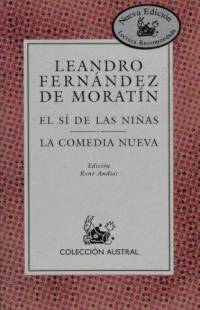
El Sí de las Niñas, or The Maiden’s Consent, by Leandro Fernández de Moratín, was the second book I analyzed for my senior thesis.
Moratín was a Spanish playwright who published many works, butThe Maiden’s Consentwas perhaps his most famous.
The play was published in 1801 and is also set in the early 19th century. It is a clear commentary on the social norms in Spain at that time, particularly those of arranged marriage.
The Maiden’s Consentis inspired by the author’s own engagement to a younger woman–an engagement that didn’t work out, as is also seen in the play.
Doña Paquita, a 16-year-old girl who was recently taken out of the convent by her mother, is engaged to be married to Don Diego, a 59-year-old wealthy man.
Doña Paquita, however, is in love with Don Carlos, who later is discovered to be Don Diego’s nephew.
One of the most interesting aspects of the play is the monologues Don Diego has in which he becomes aware of the hypocrisy of the ‘norms’ of his society.
In the first monologue, Don Diego speaks of parents forcing their children to do certain things, and the consequences of those actions. “In a matter as delicate as this, sensible parents don’t order. They suggest, they propose, they advise, yes, all of those things. But order! …And who is to escape the dismal later consequences of what they’ve ordered? … Why, how often do we see unhappy married couple, monstrous matches, entered into only because a stupid parent took it into his head to order what he never should have? …Ah! No, indeed, that never turns out well…” (50). This is an example so clear and so striking: Moratín is obviously stating his opinions on arranged marriage, and why they don’t work, certainly a fresh commentary at the time.
The second monologue by Don Diego has to do with his view on the education of girls in Spanish society. “So these are the results of education. This is what is known as giving a girl a respectable upbringing: teaching her to lie and to conceal her most innocent feelings with perfidious dissimulation. As soon as it’s evident that she’s wise in the arts of keeping silent and lying, she’s considered to be properly brought up…As long as she doesn’t say what she feels, as long as she feigns hatred for what she most desires, as long as she hastens to give, when she’s ordered to, her perjured and sacrilegious consent, which is the source of so man scandals, then she’s considered well reared…” (88). This monologue is referring to Don Diego’s awareness that Doña Paquita loves another, but has been falsifying her feelings for him to make her mother happy. Yet another striking commentary.
The last example shows what occurs when authority, especially that of parents, is abused: “This is what happens when authority is abused and when youth suffers under its oppression: these are the assurances given by parents and teachers, and this is how much a maiden’s consent is worth” (105).
All of these monologues give a clear commentary by Moratín on his opinions of Spanish society.
Literature is always based off of something, and more often then not, this something is society and what the author perceives to be wrong with it.The Maiden’s Consentis certainly no exception, and that is what makes it so interesting: a glimpse into Spanish society in the 1800s and what it was like to live there.
Moratín also gives his prediction for the future with the ending to his play: Doña Paquita and Don Carlos are given permission to marry for love by Don Diego and Doña Paquita’s mother.